Guidance on single-use plastic products banned or phased out from July 2023
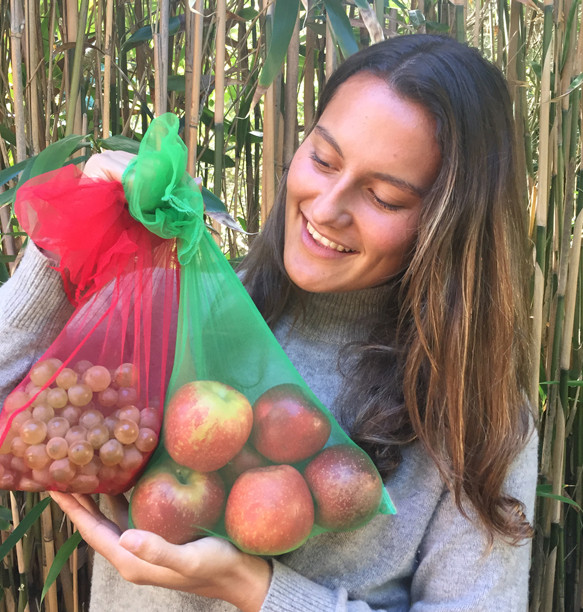

Information for businesses, industry and the general public on single-use plastic items banned, restricted or phased out from 1 July 2023.
The Waste Minimisation (Plastic and Related Products) Regulations 2022 were issued in March 2022 and amended in November 2022 [New Zealand Legislation website]
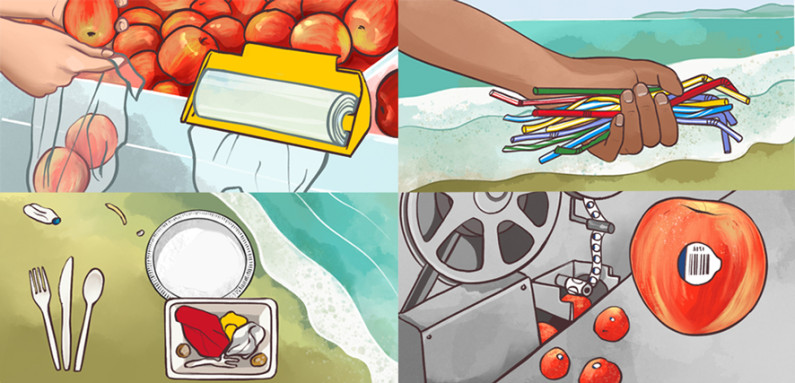
Single-use:
*Plastic straws are available for disabled people and medical use.
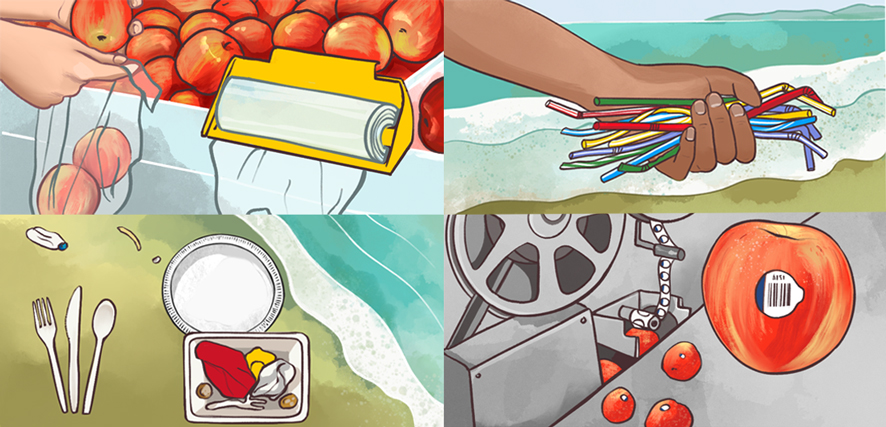
Single-use:
*Plastic straws are available for disabled people and medical use.
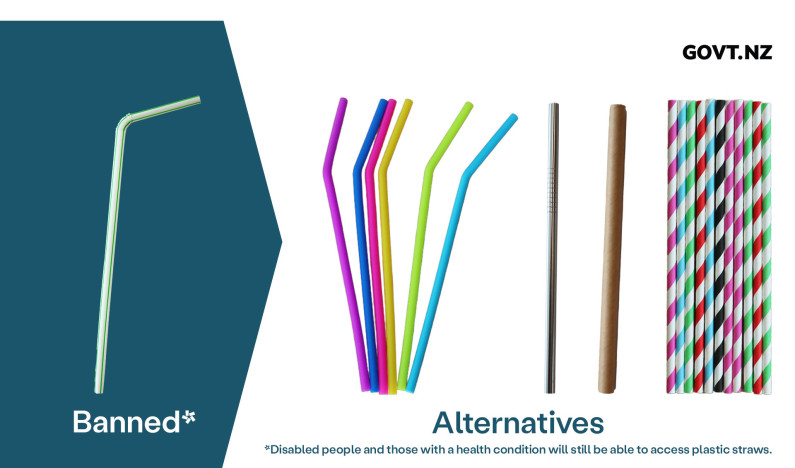
From 1 July 2023 the sale of single-use plastic drinking straws is only available to disabled people and those with health conditions.
A single-use drinking straw that contains any type of plastic (including compostable or biodegradable plastic).
Disabled people and those with health conditions (or someone acting on their behalf) are still able to access and use single-use plastic drinking straws if they need them.
Plastic straws may be needed for a nutrition reason, independence and/or social inclusion. Alternatives aren’t always suitable or safe and can be more expensive and difficult to clean.
Under the regulations, some entities and businesses are permitted to sell or provide single-use plastic drinking straws to people who need them, including:
A manufacturer or wholesale supplier may sell single-use plastic drinking straws to any of the above entities. However, an exempt entity, a supermarket or a pharmacy must not display single-use plastic drinking straws for sale.
Disabled people and those with a health condition will also still be able to buy single-use plastic drinking straws from retailers online.
For help with talking to your team or customers about the changes, see Talking to others about the 1 July bans.
Single-use plastic drinking straws can be provided on request. A person (or someone acting on their behalf) is not required to explain their disability or health condition or provide evidence of their need to access plastic straws. Plastic straws must not be on display.
Alternatives to single-use plastic drinking straws are widely available.
They include:
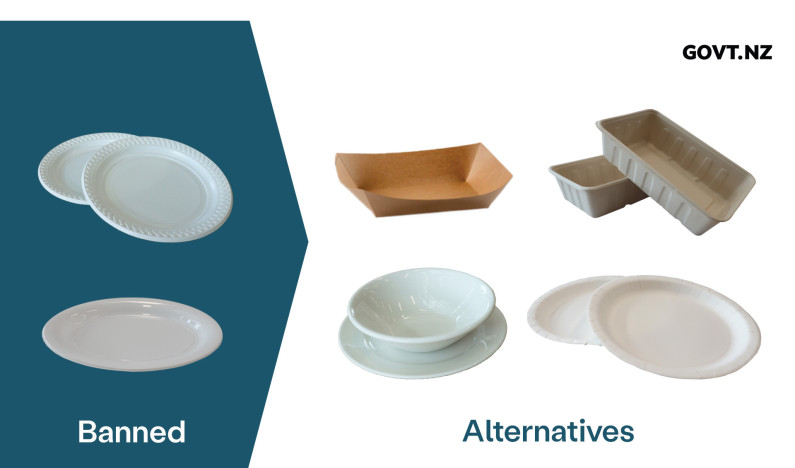
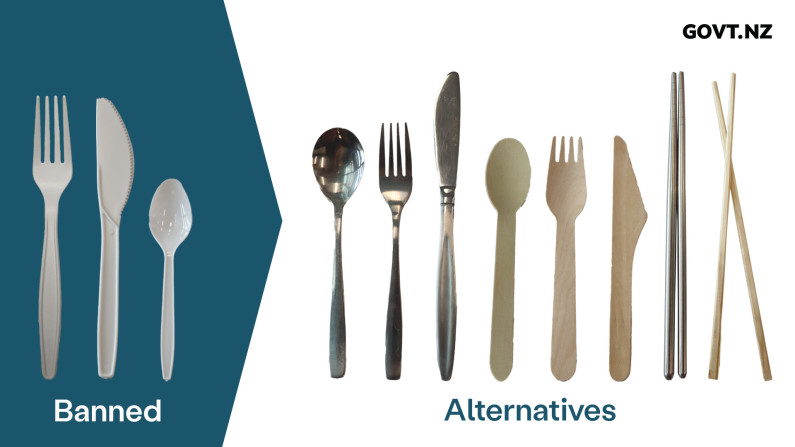
From 1 July 2023 the sale or manufacture of single-use plastic tableware and cutlery is not permitted.
Banned tableware includes single-use plastic bowls, plates and platters.
Banned cutlery includes single-use forks, spoons, teaspoons, knives and chopsticks. It also includes cutlery that is integral to the packaging of a food product (eg, cutlery sold with single-serve ice cream or salad packs).
Plastic cutlery like the example below are included in the ban.
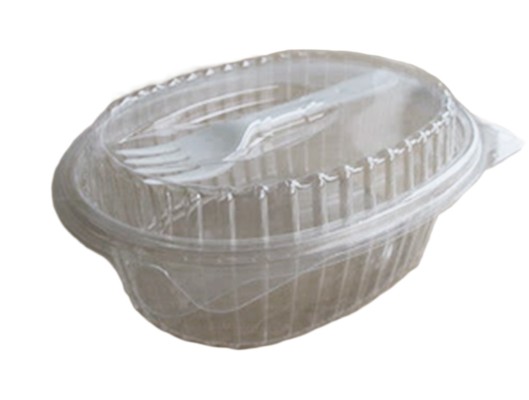
Single-use plastic tableware and cutlery are often used at food markets, parties, festivals and other events such as community and sports group gatherings.
For help with talking to customers about the changes, see Talking to others about the 1 July bans.
The ban does not include:
Alternatives to single-use plastic tableware and cutlery are widely available and include:
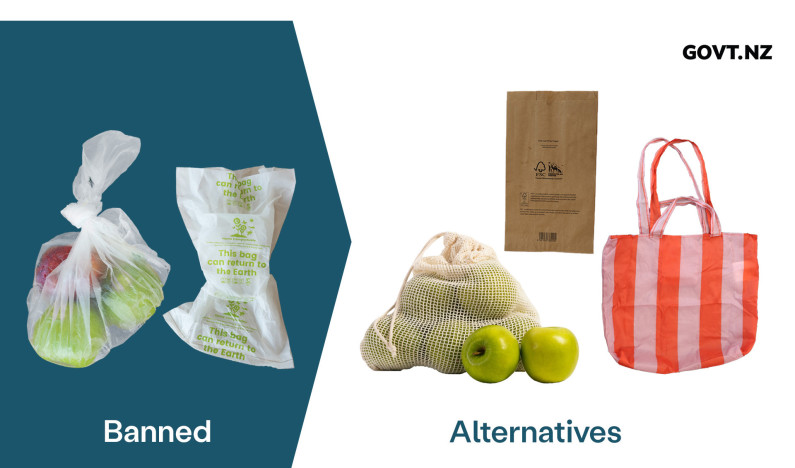
From 1 July 2023, the sale or manufacture of single-use plastic produce bags is not permitted.
Single-use plastic produce bags are unsealed plastic bags that are provided by the store or retailer to pack fresh fruits and vegetables at a place of purchase.
This ban includes single-use plastic produce bags made of:
There are no exemptions to the ban on single-use plastic produce bags.
For help with talking to customers about the changes, see Talking to others about the 1 July bans.
The regulations do not ban single-use plastic bags if they are part of the packaging for pre-packaged produce.
Pre-packaged means fruit or vegetables that are bagged (sealed or not sealed) before being put on sale.
On this basis, the ban does not include a plastic bag that is or forms an integral part of, the packaging. Examples include pre-packaged mesclun lettuce, a sealed bag of apples, a sealed bag of potatoes or sugar snap peas, leafy greens and herbs in a plastic sleeve, or bagged lettuce.
The packaging examples below are not included in the ban.
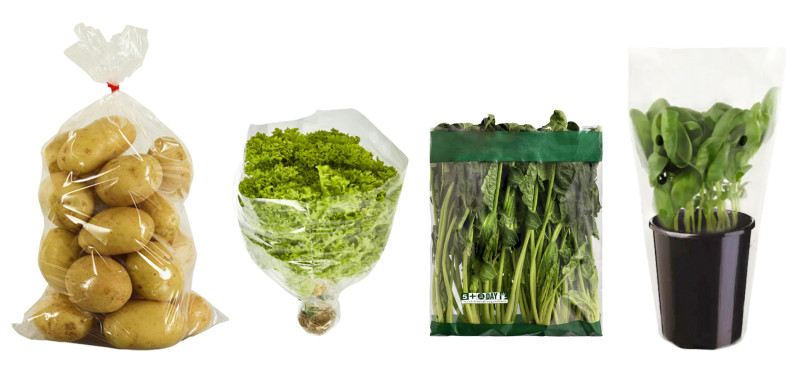
While single-use plastic produce bags are no longer be permitted, the following alternatives may be used:
Reusable produce bags that are not single-use. Single-use for an item means the item is designed or intended to be used only once or a limited number of times before being disposed of, discarded or diverted.
Under the Weights and Measures Act, it is illegal for retailers to charge for the weight of food packaging.
Most modern weighing instruments have a tare function. This should be used to zero or automatically deduct the weight of the packaging or container before the goods are weighed.
Retailers will need to make adjustments to their tare weights and/or ask customers using their own bags to take the fruits and vegetables out of the bags at checkout before weighing.
We recommend retailers and customers consider reusable bag alternatives.
For more information see Your rights when buying goods by weight or measure [Trading standards website]
If you have any questions contact MBIE’s Trading Standards Team
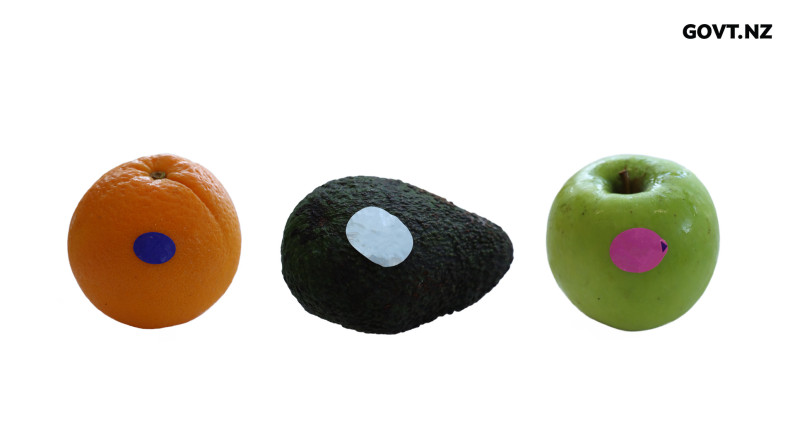
From 1 July 2023, the sale of non-compostable plastic produce labels will be phased out.
Current regulations require:
In 2024, Cabinet agreed to amend the regulations to extend the 2025 requirements to 1 July 2028. Cabinet will consider these regulatory amendments in early 2025. If approved, labels on all produce sold in Aotearoa New Zealand, including the adhesive, must be certified home-compostable by 1 July 2028.
Non-compostable plastic produce labels are labels adhered to fruit or vegetables that are made from any material that does not meet a home compostable standard.
Compostable at home means a produce label meets one of the following standards:
AS 5810-2010 Biodegradable plastics [PDF 263 KB] — Biodegradable plastics suitable for home composting.
Any plastic produce label adhered to domestically-grown produce must not be sold unless:
If the answer to all questions is yes, your produce label is included in the ban.
This diagram may help you consider whether a plastic item is likely to be single-use and included in the ban.
You may want to consider other factors that determine whether your item is single-use or reusable (eg, a warranty, ordinary consumer behaviour, compliance to an overseas reusability standard, or whether the product meets a dishwashing standard).
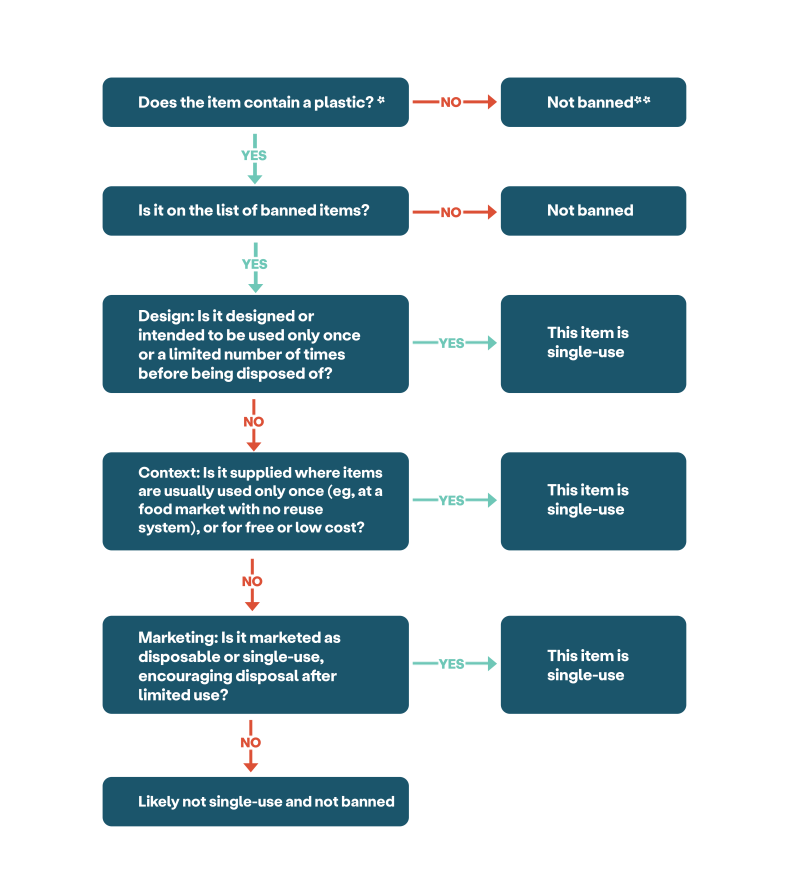
A flow chart asking a series of questions to determine whether a plastic item is single-use.
Question 1: Does the item contain plastic (which includes bio-based or compostable plastics)? If the answer is no it's not banned. An astreix provides more information that plastic-lined bowls and plates and home compostable produce labels are not included in the ban. Additives and inks that contain resins are not banned unless found in home compostable produce labels.
Question 2: Is it on the list of banned items? If the answer is no it is not banned.
Question 3: Is it designed or intended to be used only once or a limited number of times before being disposed of?
Question 4: Is it supplied where items are usually used only once (eg, at a food market with no reuse system), or for free or low cost?
Question 5: Is it marketed as disposable or single-use, encouraging disposal after limited use?
If you answer 'no' to questions 3, 4 and 5 then it is liikely that the item is not single-use and not banned.
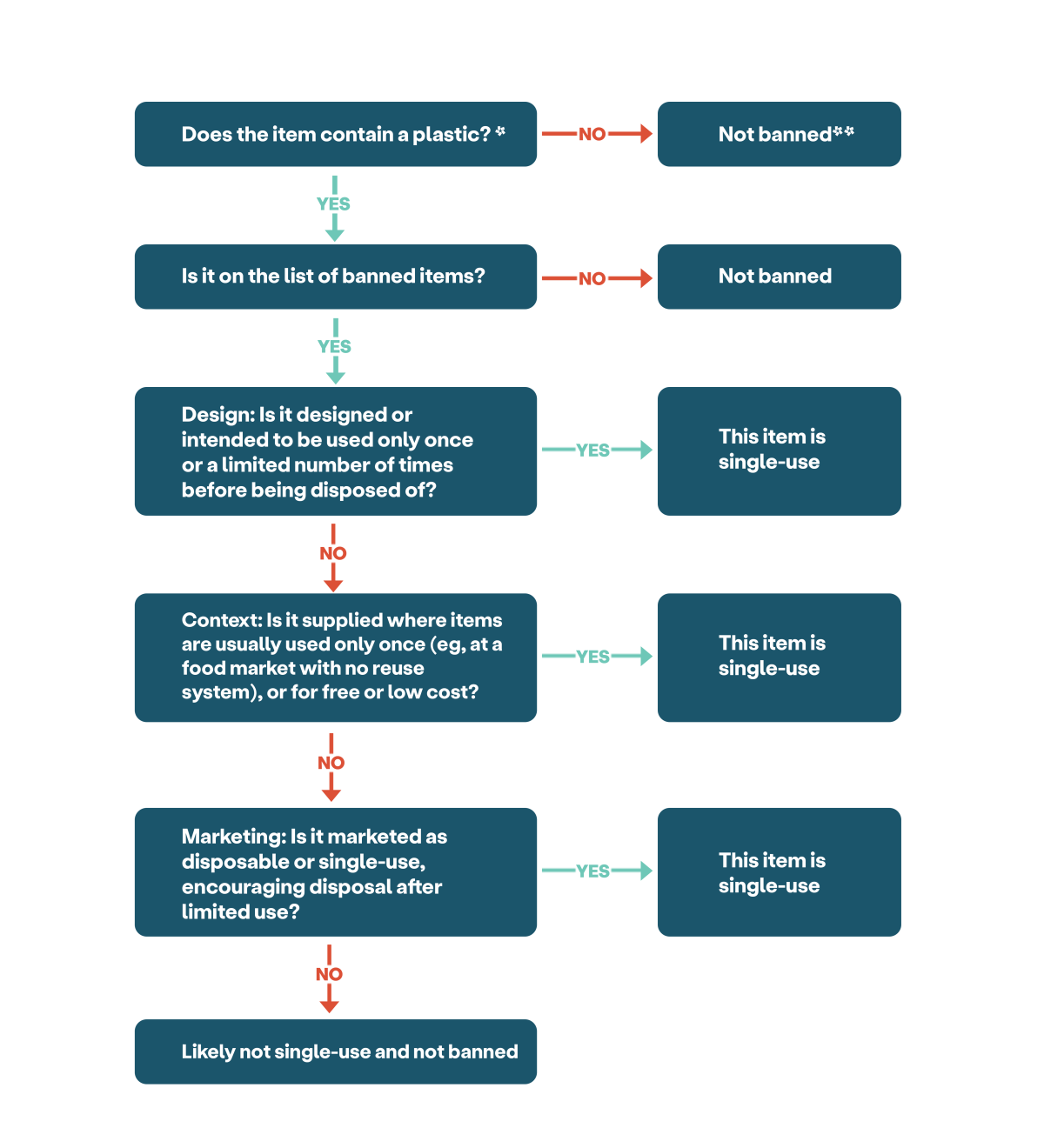
A flow chart asking a series of questions to determine whether a plastic item is single-use.
Question 1: Does the item contain plastic (which includes bio-based or compostable plastics)? If the answer is no it's not banned. An astreix provides more information that plastic-lined bowls and plates and home compostable produce labels are not included in the ban. Additives and inks that contain resins are not banned unless found in home compostable produce labels.
Question 2: Is it on the list of banned items? If the answer is no it is not banned.
Question 3: Is it designed or intended to be used only once or a limited number of times before being disposed of?
Question 4: Is it supplied where items are usually used only once (eg, at a food market with no reuse system), or for free or low cost?
Question 5: Is it marketed as disposable or single-use, encouraging disposal after limited use?
If you answer 'no' to questions 3, 4 and 5 then it is liikely that the item is not single-use and not banned.
*Plastic includes bio-based or compostable plastics, see Waste Minimisation (Plastic and Related Products) Amendment Regulations – November 2022
**Plastic-lined bowls and plates and home compostable produce labels are not included in the ban. Additives and inks that contain resins are not banned unless found in home compostable produce labels.
The Commerce Commission advises that under the Fair Trading Act, you must have reasonable grounds for claims at the time they are made. This means that if a manufacturer/supplier/retailer claims that a product is reusable they must have facts, figures or credible sources of information to base this on.
See environmental claims guidelines [Commerce Commission website]
For help with talking to your team or customers about the changes, see Talking to others about the 1 July bans.
For help with talking to customers about the changes, see Talking to others about the 1 July bans.
The information below is designed to be a guide only.
Consider choosing products or packaging that are reusable (eg, metal cutlery). Reusable products keep the resources in use for longer.
Consider the materials in your product or packaging. Some materials are harmful and some are easier to recycle and reuse than others. Consider choosing products that are made from less harmful materials and/or are more easily reused or reprocessed.
Understanding how the product or packaging performs for your purposes is important to deliver the best outcomes for you and your customers.
Understanding how the product or packaging is made means you can choose an option that uses fewer resources and produces less greenhouse gas emissions.
Understanding where the product or packaging is made allows you to consider the greenhouse gas emissions involved in its transport. Generally, choosing products or packaging made in Aotearoa New Zealand reduces greenhouse gas emissions from transport.
Products or packaging that have recycled content are generally less resource-intensive to manufacture than products with no recycled content.
You may find the facts below helpful if you need to explain the bans to your customers or others.
All businesses are legally obligated to comply with the regulations. The Ministry for the Environment will first work with businesses to ensure they understand their obligations, however penalties apply for non-compliance.
We will generally take an educational approach and offer advice to help businesses understand their responsibilities. The way we work is guided by our Compliance, monitoring and enforcement strategy.
We will take enforcement action where appropriate, particularly where systemic or ongoing non-compliance occurs. Parties that contravene the Waste Minimisation Act 2008 may face prosecution and, if convicted, fines of up to $100,000 per offence. All prosecution decisions are made subject to our Prosecutions policy and Enforcement decision making policy.
Fill out this online form for reporting suspected non-compliance.
Some moulded fibre-based products, such as bowls and plates have PFAS linings which make them water and grease resistant. This can include products that are marketed as more ‘eco-friendly’.
PFAS stands for Perfluoroalkyl and Polyfluroalkyl substances which are a wide group of synthesized chemicals. PFAS are becoming a serious health concern as they can accumulate in soil, plants, and the human body. PFAS can be intentionally or unintentionally added (eg, when a product contains recycled content).
Plastic means any plastic material that is manufactured from any source (including a bio-based source) whether or not it is designed to degrade in a particular way.
The definition of sale in the regulations includes selling for monetary value, providing for free, distribution or delivery and wholesale supply to retailers.
Single-use means the item is designed or intended to be used only once or a limited number of times before being disposed of or discarded.

Guidance on single-use plastic products banned or phased out from July 2023
July 2023
© Ministry for the Environment